They honor Black history though music, dance and plans for a west Charlotte arts center
When vocalist Toni Tupponce is at the mic, it’s clear she’s a natural storyteller.
At a recent free Arts & Science Council Culture Blocks performance at the West Boulevard Library in Charlotte, she moved seamlessly from silky vocals to captivating stories. Tupponce was performing with A Sign of the Times, the band she and her husband, trombonist Tyrone Jefferson, headline.
The couple also runs the non-profit organization, A Sign of the Times of the Carolinas, which focuses on sharing Black history through music, dance and spoken word. Jefferson serves as executive director and Tupponce as program director.
Now, they are looking toward the future, trying to expand their reach with ambitious plans to create a Black Research and Performing Arts Center in west Charlotte and secure the next generation of leadership for the nonprofit.
And even though this library appearance wasn’t one of their educational events, their reverence for history could be felt at every step.
During one medley, Tupponce weaved in tidbits about the composers behind each song, including Ben E. King’s, “Stand By Me,” Sam Cooke’s “Cupid,” Otis Redding’s “(Sittin’ On) The Dock of the Bay” and James Brown’s “Try Me.”
“Sam Cooke was John Legend of 1965,” she told the crowd, honing in on two tweens. She explained how Redding was only 26 when he died in a plane crash and his song was published posthumously.
Then she spoke about Brown, pausing momentarily to share a smile with her husband, whose extensive resume includes serving as music director to “the Godfather of Soul” on and off for more than 25 years.
At the end of the medley, Tupponce addressed the kids directly. “You see, you had a history lesson today and it wasn’t so bad.”
“Way better than school!” replied 12-year old Robert Hood.
That’s the kind of impact Tupponce and Jefferson hope to have in all of their work, as they use the performing arts to celebrate Black excellence and share the history of African Americans and other people of the African diaspora.
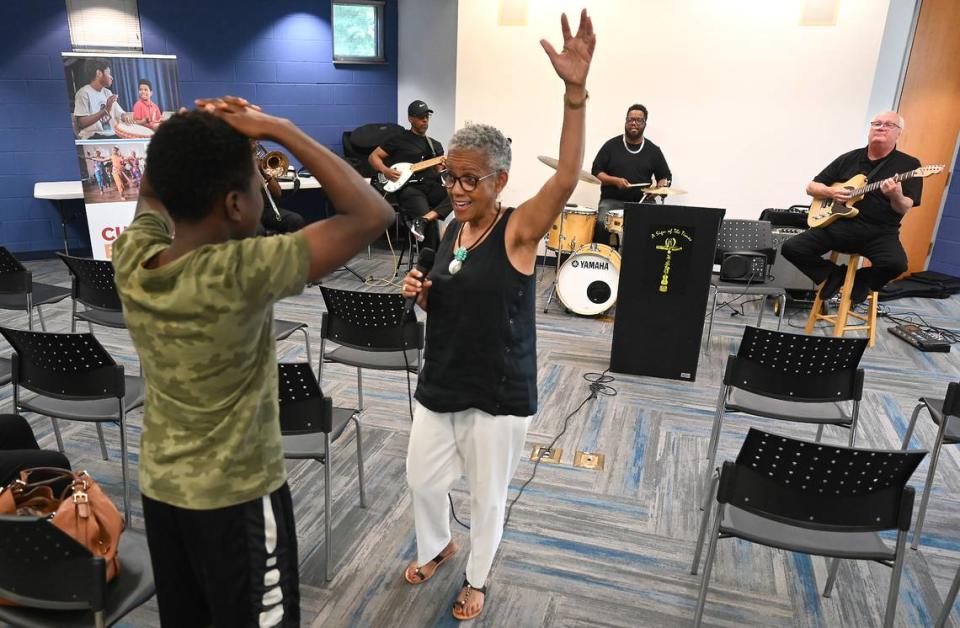
About A Sign of the Times
Jefferson launched the band in 1999, and they play a range of genres including jazz, Big Band, blues, classic R&B and funk at corporate, private and public events. But it was originally started as a composer’s band to highlight original compositions by its members.
“I just wanted people to be able to come in and have their charts played by musicians,” said Jefferson, who has penned more than 400 compositions and arrangements throughout his career. But as soon as the group played their first gig — a special Big Band concert at North Carolina A&T, Jefferson’s alma mater — the opportunities to perform kept coming.
In 2005, the couple got married and launched their non-profit. It oversees eight annual programs, including concerts and educational events, as well as customized lectures or conversations for groups like schools, churches and senior communities.
With art, “you can touch a lot more people with a lot more information,” Tupponce said. “Sometimes they don’t even know they’re getting the information until they get home and it hits them.”
The organization’s flagship event is an annual Black history concert in February or March, where the band performs alongside African drummers and dancers. It also organizes Bridging Musical Worlds, a collaborative concert with community partners honoring the legacy of Martin Luther King Jr. and benefiting My Sister’s House, a transitional living program for homeless women.
Those collaborative concerts have included groups like the Charlotte Symphony, the Charlotte Folk Society, Tosco Music and UNC Charlotte College of Arts + Architecture.
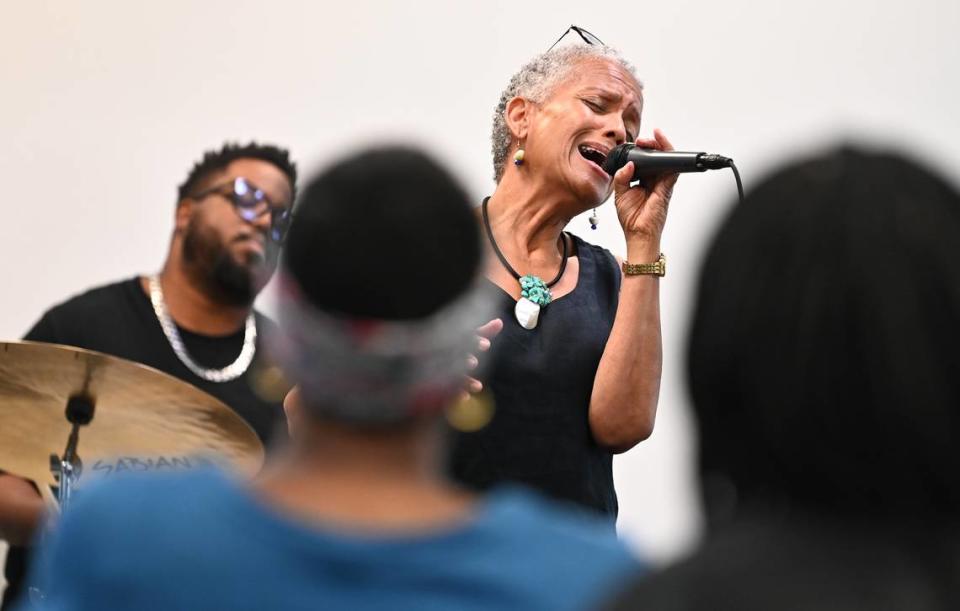
Another program features a nine-week series of lectures featuring local historians on topics covering ancient Africa to the modern day, which according to the website includes “facts about Black folks that (most likely) were not taught in secondary schools or universities.”
Some programs are free and others have a small charge, Tupponce said. A significant portion of their funding comes from grants that help pay guest lecturers and musicians for events.
Grants also enable the organization to cover the costs of serving groups unable to pay their total fee. About 20% of profits from the band’s gigs are also redirected toward the non-profit.
Their next sponsored program is on June 30 at 4 p.m. at the Arts Factory, 1545 W. Trade Street in the Black Box Theater.
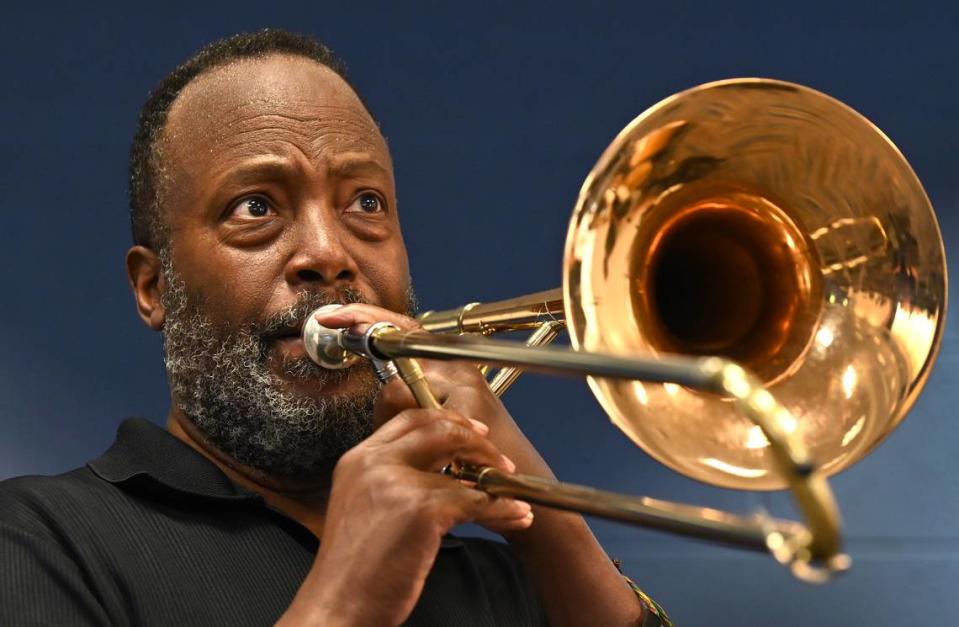
Arts center plans on Charlotte’s west side
And now, Jefferson and Tupponce are embarking on a major initiative to create a place where they can bring performance, education and research all under one roof. That includes a permanent home for their nonprofit.
They are in the early stages of a 10-year capital campaign to create a Black Research and Performing Arts Center on Charlotte’s west side. In 2022, they started a soft launch for it but have not gone wider yet.
“The 10-year goal was initially $2 million,” Tupponce said. “We realize that it will take a lot more than that to complete a project of this size. A lot depends on how we ultimately proceed.”
If they can collaborate with a church with an underused facility, for example, the startup cost would be less, she added. And there ultimately may be more than one iteration of the Black Research and Performing Arts Center.
“We recognize that it will only work as a collaborative project with several community partners,” Tupponce said.
Their plans for now include rehearsal and performance space and a research library with books on Black history and original music manuscripts. They also envision educational programs on Black history from ancient Africa through modern times, with a special emphasis on “the pre-enslavement legacy of mighty African Empires” prior to 1619.
“You can’t talk about Black music in truth without talking about Africa,” Tupponce said, “because you can’t talk about Black music without talking about the drum and its influence on everything we do.
“Well, you can’t talk about the drum without talking about enslavement and the fact that it was taken away from the enslaved people. But they still had the rhythm, and the rhythm came into the music and the music keeps the drum alive.”
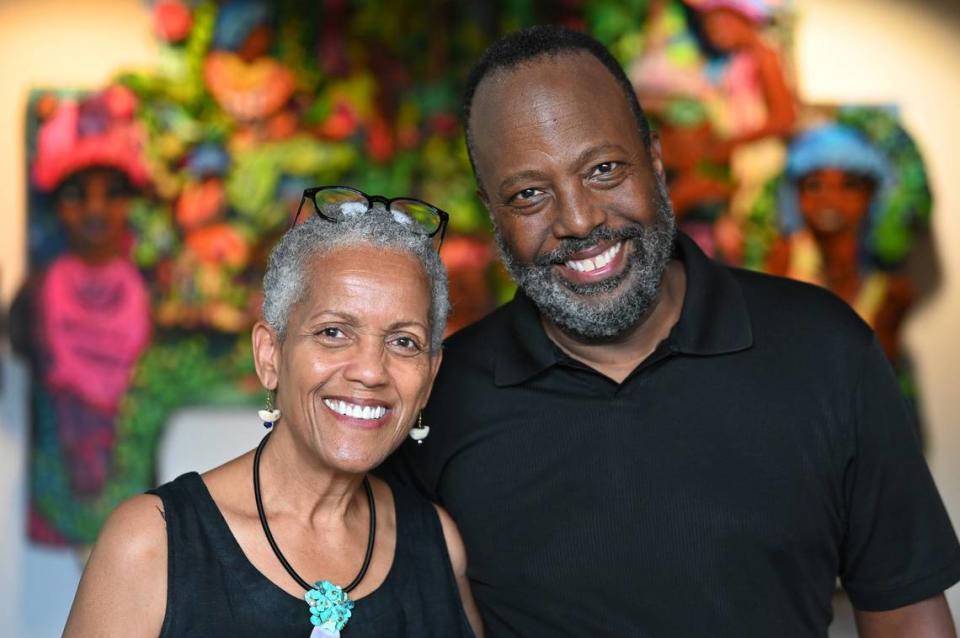
“An informed audience’
The arts center also would be a place for conversations on contemporary issues like social and cultural equity, disparities in healthcare and education, and the ways gentrification affects Black communities.
Jefferson said their vision is modeled on the Schomburg Center for Research in Black Culture in Harlem.
“You can go look at all their archives, photos of Black folks back in the ‘20s and ‘30s and ‘40s, and I’m trying to create that same concept here in Charlotte,” he said. “I’ve got to put together a team of people who believe in this so we can raise… $500,000 or $600,000 or something, just to get it started.”
Tupponce remembers attending a lecture in Harlem (not at the Schomburg) where she was inspired by the level of community engagement.
People heard from an expert and then there was real conversation that followed. That’s what they’d like to see happen in Charlotte too.
“To do that you have to have an informed audience,” she said. “And Charlotte has some of the smartest people in the world in our community. We want to have a place where those thoughts can run freely without worrying about what somebody might think about my thought and whether I have to be careful with what I say and how I say it.
“There needs to be a place where you can be free to respectfully… hear from somebody else and have that exchange of ideas.”
Jefferson initially had hoped to purchase the Grand Theater on Beatties Ford Road to establish the performing arts center, but hasn’t been able to make inroads with the owner. There’s still hope, he said, because the theater is still unused.
Tupponce said a collaboration with a faith community could turn out to be the “sweet spot” they need to make the arts center a reality.
“He and I go back and forth on that a little bit,” Tupponce said of her husband, “because I see the world a little bit differently. But I think if we collaborate, we will have more people involved and more people owning the desire for success.”
“That’s what makes us great,” Jefferson added with a smile. “Cuz’ opposites attract.”
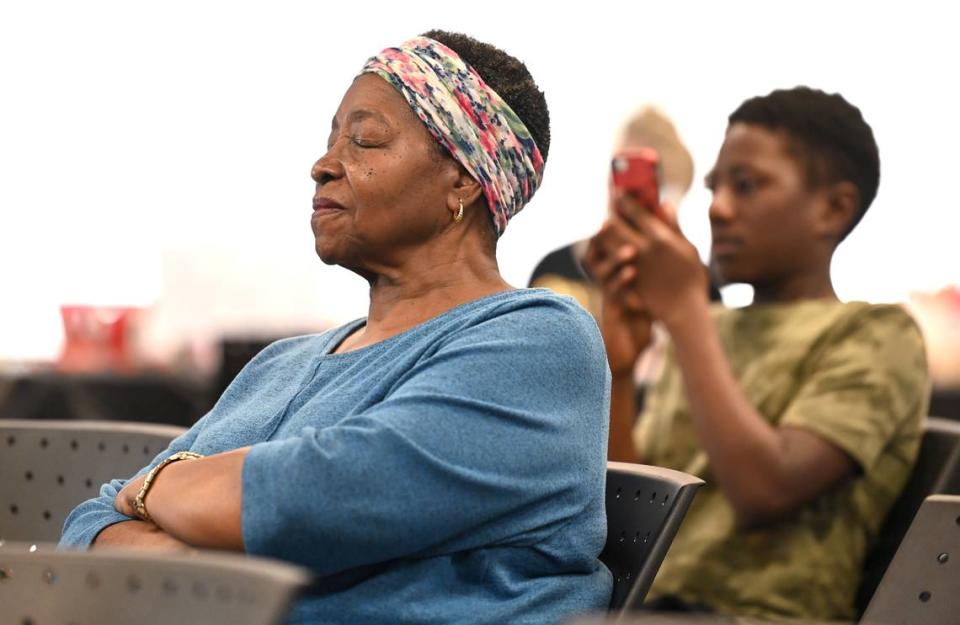
Looking to the future
For Tupponce and Jefferson, the other big challenge moving forward is sustainability for their organization and finding the right people with knowledge and passion for Black history. They would need other skills as well to lead their organization into the next generation.
Both are in their 70s and want to ensure they are able to help support those new leaders and set them up for success.
“I know some people in this community that have every bit as much passion as we do,” Tupponce said. “They live in the world differently than we do but that’s appropriate.
“So, that means A Sign of the Times will do a little bit of shifting just as another generation takes on the work. But we should be there to teach things like relationship building, … thinking about history and the good of the whole as much as you do the dollar.”
More arts coverage
Want to see more stories like this? Sign up here for our free “Inside Charlotte Arts” newsletter: charlotteobserver.com/newsletters. And you can join our Facebook group, “Inside Charlotte Arts,” by going here: facebook.com/groups/insidecharlottearts.
